Joanna Letz is the granddaughter of Jewish immigrants from Poland. Both sides of her family were poultry farmers (in New Jersey and California). Her California Grandpa had a big garden, and was always growing things. Joanna just knew about growing plants from an early age. She’s got growing in her genes.
She was raised in Oakland, California, did a six-month program at University of California Santa Cruz in Agroecology, and worked at a number of famous California farms (Slide Ranch, Green Gulch, Amigo Bob’s place - Heaven and Earth Farm). Joanna took all this experience in farming and took the plunge in 2014 to start her own farm business. With no land and no equipment, Joanna had to find just the right opportunity to get things going.
She found land to lease at the Sunol Ag Park in Sunol, California. It’s just a half-mile off a major freeway, through a forbidding gate pointing towards the Water Temple. Say what? The Water Temple is a historic site where local waters used to flow through to be sent to San Francisco for drinking water. It is now defunct, but has been restored as a landmark.
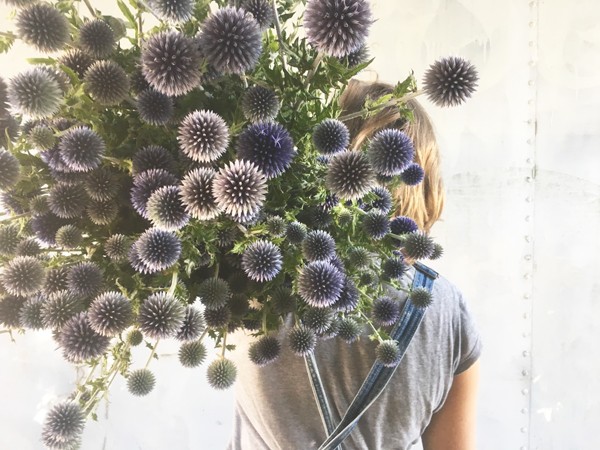
The San Francisco Public Utilities Commission owns the land, and they partnered with a non-profit group SAGE (Sustainable Ag Education) to create an 18-acre farm center. This is not an incubator farm per se, just a great place for farmers to get access to land. The management has since been taken over by the Alameda County Resource and Conservation District. This land was previously leased to organic farmers, and before that to conventional farmers that grew mostly tomatoes and strawberries (more on that later). This perfectly flat, prime farmland lies in a small valley, just 45 minutes southeast of Oakland, where Joanna still lives.
It’s early October, and the whole surrounding landscape is very dry. It doesn’t rain here, at all, between April and October. The close by hills are brown and crisp, dotted with wide-spreading valley oaks. The air is dry, anything not irrigated is dusty. Inside this fence is an oasis of productivity – multiple quarter acre plots growing a myriad of crops, green and gold and pink everywhere.
Joanna walks from the flower patch to greet me. She’s young (30 something) and lean, smiling, lovely and pretty tough looking. It’s 85 degrees out here, blazing sunshine, so we head for the shade at the edge of the property where she’s got some tools and chairs and a work space set up for two women seeding flats. Joanna and I get right to it – she’s already warned me that she’s got to hit the road in a couple hours. So we chat there, with her workers seeding flats just steps away – Joanna has nothing to hide from these women, she’s hoping they learn something by being present to the interview.
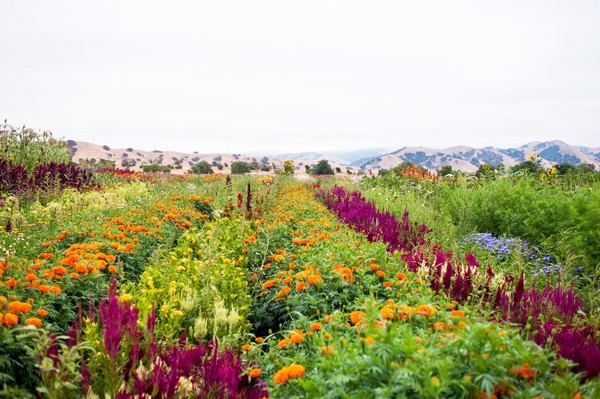
Once Joanna secured the lease for her first plots in the fall of 2014, she quickly planted cover crops. Hearing this warms my heart – I have so loved growing cover crops – and am impressed that she had the wisdom to start her farm off on the right foot. Joanna grew a mixture of flowers and vegetables her first full growing year. As that season progressed, the flowers required so much time to manage, harvest and sell, that she had to let go of the vegetable crops. It’s been all flowers ever since.
Why flowers, when so much of her experience came from vegetable farms? Joanna knew her growing space would be very limited, so growing the most profitable crop per acre was crucial – and she figured that was cut flowers. This has been a steep learning curve. Growing high quality cut flowers for the discriminating floral industry is both an art and a very complicated and detailed science. Each species, even each variety, has its own proclivities and demands. Joanna quickly joined the ASCFG (Association of Specialty Cut Flower Growers), and has attended numerous conferences to hone her learning. And she’s got great connections from past jobs, to act as mentors and advisors.
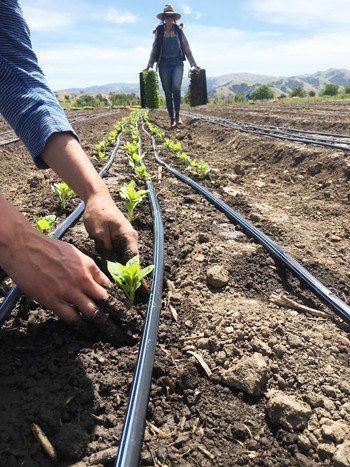
While Bluma Farm is only in its third production season, Joanna has a little air of weariness about her. It is October, and it is hot, and it’s probably been a long week. But, she’s been at this farm game for over ten years already, and she can feel the limitations of her body starting to speak up. A longtime friend, someone who inspired Joanna to keep at farming over the years, has just announced she’s quitting her own farm. This news weighs heavily on Joanna, making her question her path, her choices, her future. Offsetting this doubt, Joanna can’t help but express pride in what she’s accomplished so far. She loves the work still, and being outside so much. But commuting 45 minutes each way every day is tiring. And, sometimes it’s just so HOT, over 100 degrees many days in the summer. The climate is at times so hard on people and on the flowers. “Then as I walk by again…the flowers – they are just so beautiful,” said Joanna.
Bluma Farms biggest challenges come in three distinct areas:
Weeds – Joanna thinks this property has a particularly rich weed seed bank. She has no mechanical cultivation of any kind, uses no black plastic, or landscape cloth, or straw mulch. She is completely reliant on hula hoe and hand weeding. She needs some new solutions.
Finances/bookkeeping – Joanna became a client of the non-profit Kitchen Table Advisors, who have provided her with a person to help her understand the numbers of her business, at no cost. She has a monthly appointment with her advisor, but it’s just hard going. Her advisor was crucial in helping Joanna decide to purchase a brand new 14’ refrigerated box truck. Her parents fronted the money, and she’s on a payment plan now. This is her biggest investment in the business so far.
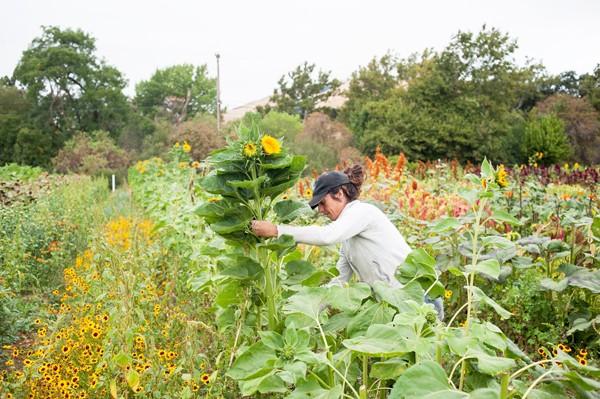
Keeping staff happy – this is Joanna’s first year with full-time staff. She loves the help, and has been blessed with two wonderfully dedicated and hardworking employees. She is honored to be an employer. But she’s got a lot to learn about creating workable systems and being a manager. Making a go of it here at the Ag Park has had its challenges as well. Joanna is grateful for all that she has, but some of the battles have been tiring. She had to lobby hard to get the landowners to bring electricity to the farm so she could set up a walk-in cooler. Before that she was lucky enough to use a cooler at a neighboring farmer’s home in Sunol. There is a profusion of lygus bugs and residual verticillium wilt – the legacy of many years of tomato and strawberry production. And, the commute, remember that? The farm lease program has no equipment or buildings to rent. Joanna has made trades and arrangements with other grower lessees, and put up temporary structures, but it’s imperfect at best.
Markets
Farmers markets are Bluma Farms’ major revenue source. She attends two per week, the best one on Saturday at San Francisco’s famed Ferry Plaza Market. It’s hard for new growers to get into markets- her first year she was at a local market near Sunol but the sales didn’t justify her continuing there. She was lucky that she approached the Ferry Plaza market at exactly the right time, when another long-time flower grower was just leaving.
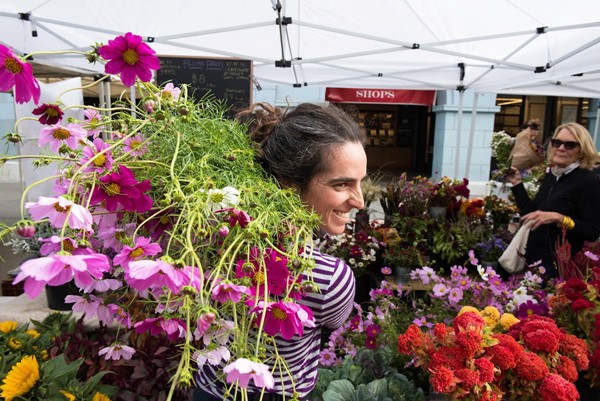
This opportunity has been a game changer – with sales more than double that of her other market. Bluma Farm sells growers bunches – big bunches of single varieties. They don’t sell single stems or bring pre-made mixed bouquets. They do some custom bouquet making at market, but none sell for under $20. Joanna feels any price less than that isn’t fair and doesn’t make economic sense. Joanna has already turned over the reins of this prime market to her employees, so that she can take a weekend day off or get other farm jobs done.
The second revenue source comes from grocery store and restaurant sales. These customers are relentless at pressing against her price points, which is trying. She had a restaurant account that she did weekly floral designs for that was grossing $25,000/year. That account dropped her completely saying they couldn’t afford her product any longer.
Joanna was excited this year to increase her sales to local florists. The Bay Area is home to numerous florists who now seek out Bluma Farm’s gorgeous blooms. Joanna is encouraged by how these sales have increased so far. These customers are very appreciative of quality and variety, and know that they have to pay for it. Joanna has found that Instagram is a great way to create excitement for this sector of customers, and she’s doing a great job promoting the farm on that platform.
Bluma Farm has made tremendous strides in just three years. Farm sales have increased rapidly over that time. She increased her gross sales after year 1 by 300%. And after year three by another 50%. Joanna’s farm experience and her good connections in the ag world have certainly helped. But mostly she’s just been brave and worked super hard to make this business go. She’s just about decided that she’s got to get the farm moved closer to home, to Oakland. But so far no one has miraculously bequeathed her land there.
I expect that Joanna will figure out how to make this next chapter of her dream come true. She’s incredibly resourceful and resilient, and people are inspired by her determination and attitude. She would love to have a farm partner, and maybe that will be the relationship that links her to the vibrant vision she holds for her business. No matter what, Joanna has done an incredible job creating a business from virtually nothing. May she find her way towards a healthy, balanced, and profitable farm business.
Ellen Polishuk just retired from growing 25 acres of ecoganic vegetables and other crops at Potomac Vegetable Farms in northern Virginia. She is now a full-time farm consultant, writer and teacher. Ellen is passionate about helping growers around the country improve their soils, labor management practices and their businesses so that they can increase farm profits and achieve a joyful balanced life. For more information go to ellenpolishuk.com.

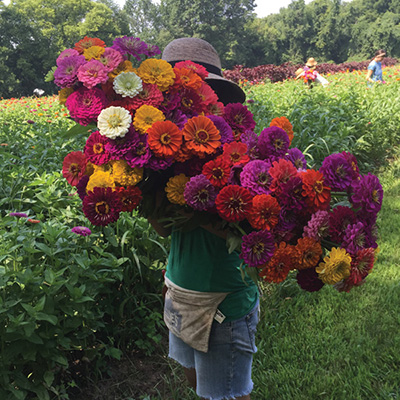
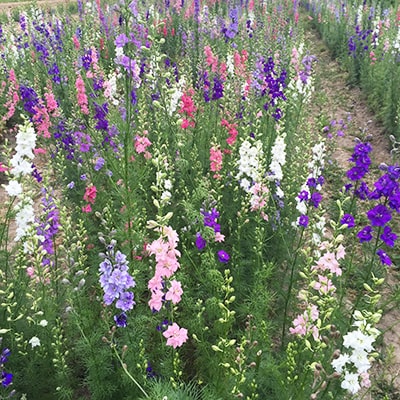

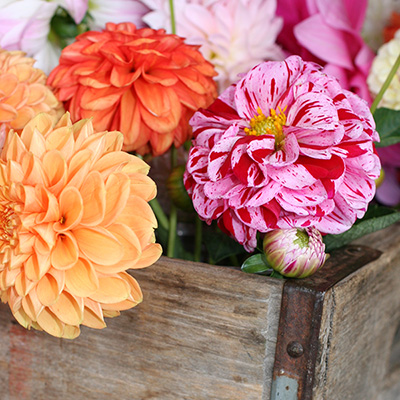



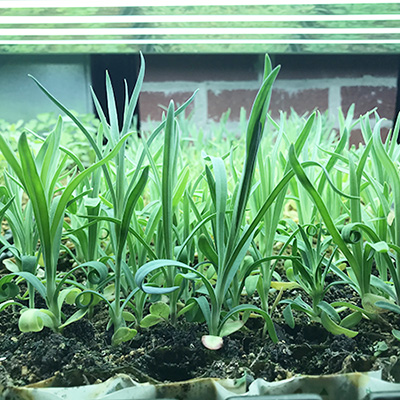
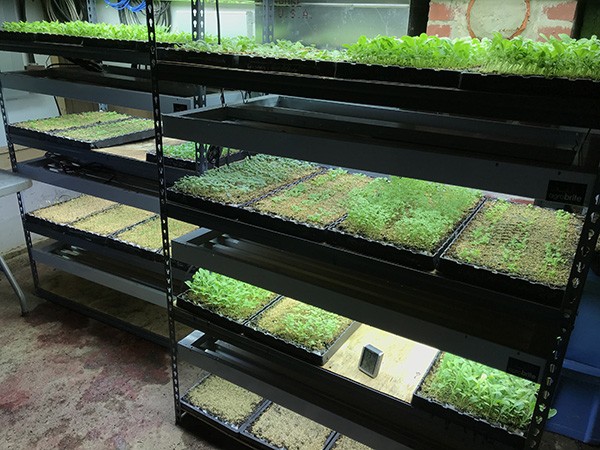 Have you ever lost precious seedlings in your greenhouse to frost? How about tossing a flat or two out due to heat stress or a missed watering? Or better still, stared at a tray of seeds that won’t germinate, with smoke coming out of your ears, because you’re sure someone (not you!) mis-watered them at a critical moment? Have you ever shrugged to yourself reading the growing instructions on a seed packet that says “Germinates best at 70 Fahrenheit” while standing in your 85-90 degree greenhouse? You’ve started to look into a germination chamber to solve some of these issues, but they look pricey and have limitations like not being able to handle as many flats as you’d like to start at once.
Have you ever lost precious seedlings in your greenhouse to frost? How about tossing a flat or two out due to heat stress or a missed watering? Or better still, stared at a tray of seeds that won’t germinate, with smoke coming out of your ears, because you’re sure someone (not you!) mis-watered them at a critical moment? Have you ever shrugged to yourself reading the growing instructions on a seed packet that says “Germinates best at 70 Fahrenheit” while standing in your 85-90 degree greenhouse? You’ve started to look into a germination chamber to solve some of these issues, but they look pricey and have limitations like not being able to handle as many flats as you’d like to start at once.

 Lorna Jackson started flower farming intensely relatively later in life at Ninebark Farm on a century-old hayfield in Metchosin at the southern tip of Vancouver Island in British Columbia, Canada. Now 64, she plans to continue into her 70s. To keep going, she makes adaptations to ease the toll on her body.
Lorna Jackson started flower farming intensely relatively later in life at Ninebark Farm on a century-old hayfield in Metchosin at the southern tip of Vancouver Island in British Columbia, Canada. Now 64, she plans to continue into her 70s. To keep going, she makes adaptations to ease the toll on her body.
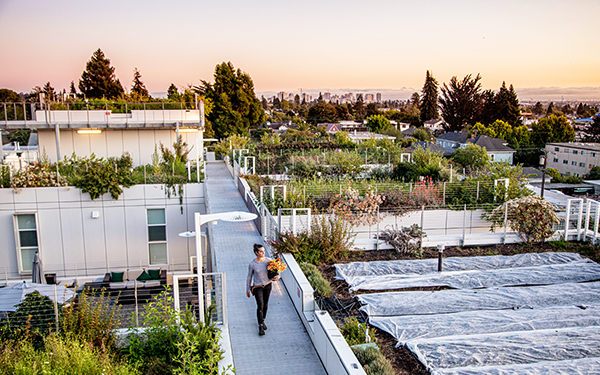 I own and operate Bluma Flower Farm, currently located on a rooftop in downtown Berkeley, California. Going into this year my plan was to try to replicate what I did the year before, one of Bluma’s best years yet. This would have been the first year I didn’t make any big changes. But then the pandemic hit and, of course, like many other businesses, I had to pivot and find ways to survive.
I own and operate Bluma Flower Farm, currently located on a rooftop in downtown Berkeley, California. Going into this year my plan was to try to replicate what I did the year before, one of Bluma’s best years yet. This would have been the first year I didn’t make any big changes. But then the pandemic hit and, of course, like many other businesses, I had to pivot and find ways to survive. 
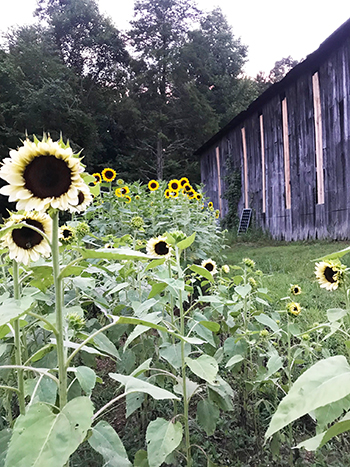 After spending years working in a corporate environment and managing key performance indicators, I was excited about the prospect of farming without the overhead of data analysis. Gone would be the management by objectives, the need to determine return on investment and other such details on which the corporate world revolves.
After spending years working in a corporate environment and managing key performance indicators, I was excited about the prospect of farming without the overhead of data analysis. Gone would be the management by objectives, the need to determine return on investment and other such details on which the corporate world revolves.
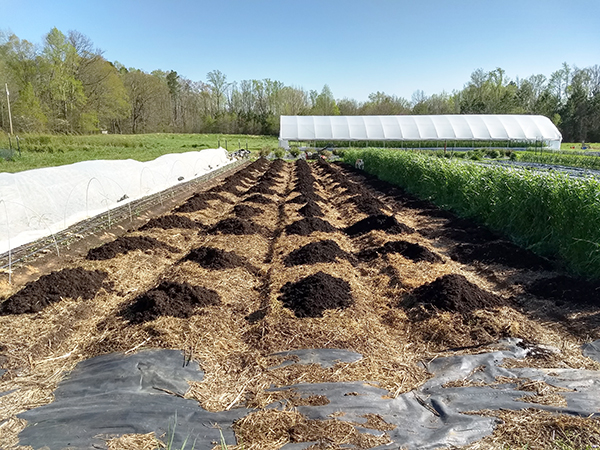 My wife, Megan, and I grow cut flowers on half an acre of a twelve-acre property in Hurdle Mills, NC. We are in the heart of tobacco country. When we bought our property in 2013, our sales contract stipulated that the farmer had the right to harvest that year’s tobacco crop. Based on our best guesses, that marked at least the 100th consecutive year of tobacco/wheat rotations on this property. The farmer was kind enough to disc in the tobacco stubble after the harvest.
My wife, Megan, and I grow cut flowers on half an acre of a twelve-acre property in Hurdle Mills, NC. We are in the heart of tobacco country. When we bought our property in 2013, our sales contract stipulated that the farmer had the right to harvest that year’s tobacco crop. Based on our best guesses, that marked at least the 100th consecutive year of tobacco/wheat rotations on this property. The farmer was kind enough to disc in the tobacco stubble after the harvest.
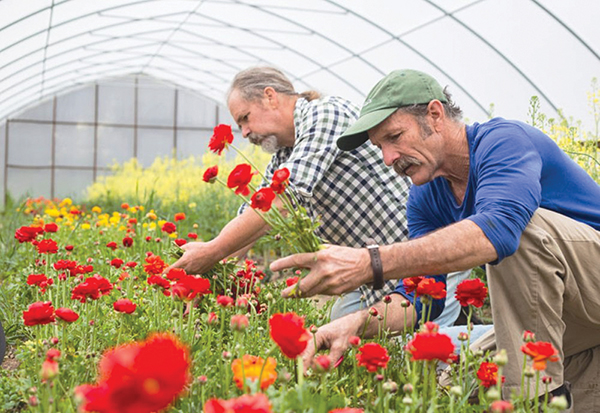 During the COVID era my usual travels have been curtailed. So, I got to thinking about what farms I had visited in the past that I knew pretty well, where a simple phone call could possibly stand-in for a proper on-farm interview and tour. First to my mind was Dripping Springs Garden, an oasis of natural and man-made beauty that is the life’s work of a good friend of mine, Mark Cain, and his farm partner, Michael Crane.
During the COVID era my usual travels have been curtailed. So, I got to thinking about what farms I had visited in the past that I knew pretty well, where a simple phone call could possibly stand-in for a proper on-farm interview and tour. First to my mind was Dripping Springs Garden, an oasis of natural and man-made beauty that is the life’s work of a good friend of mine, Mark Cain, and his farm partner, Michael Crane.